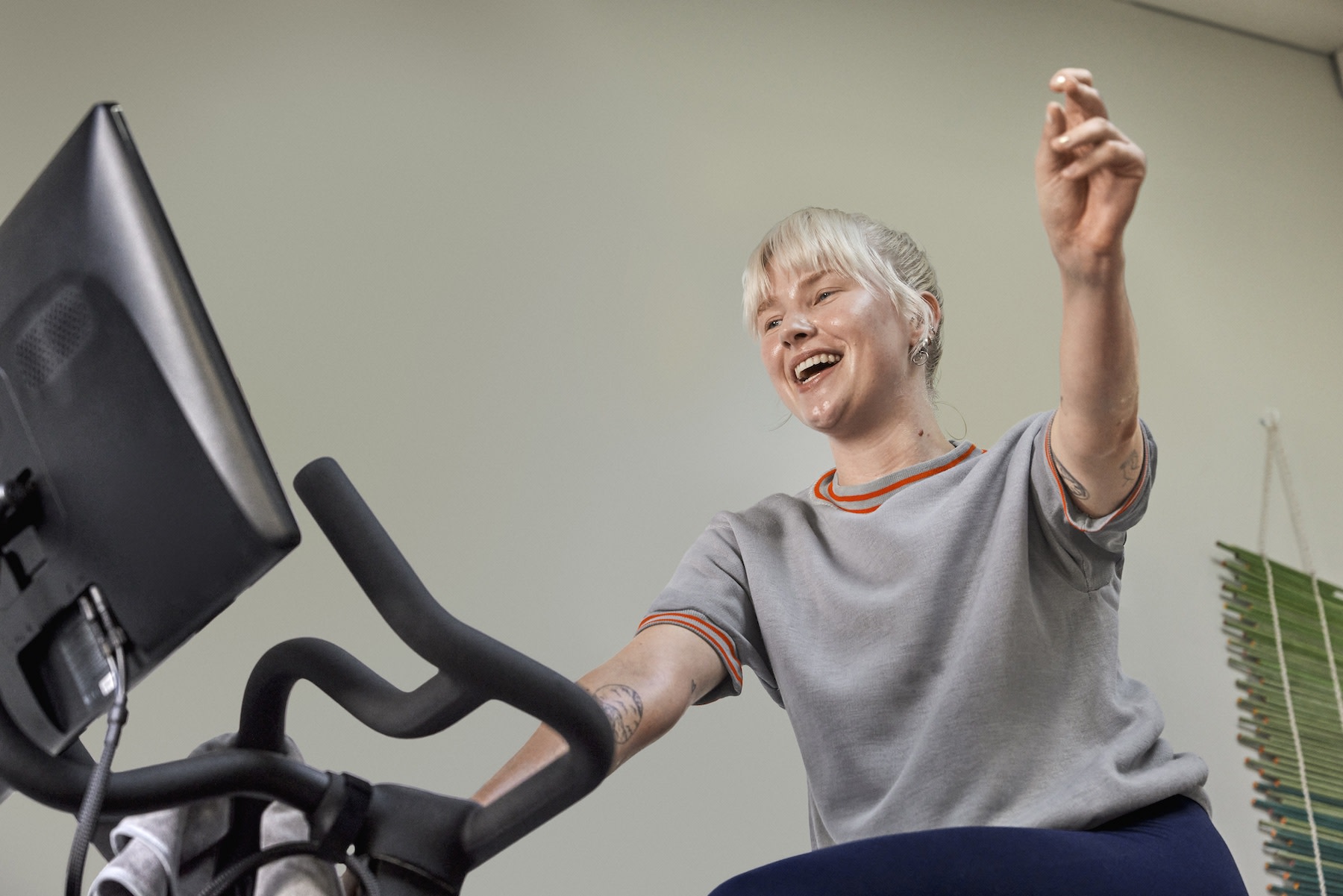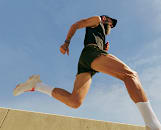
The Joy of Trying Something New
As an adult, why does trying new things feel scary at first—and then so joyful? Science offers a few explanations.
By Michelle Konstantinovsky•
The Science Behind Trying Something New—And Why It Feels So Tough
The Benefits of Trying New Things Often Outweigh the Risks
How to Actually Get Psyched to Try Something New
The Takeaway
Few things terrify me more than unfamiliar athletic experiences. Case in point: The first time I tried snowboarding, I spent the week prior agonizing over my decision and regretting the commitment I’d made to propel myself down a mountain. As a lifelong indoor kid, the prospect of trying something so big, bold, and brand new out in the elements—and in front of other people’s eyeballs—made me a little queasy.
Discover more ways to reach your goals with Peloton
Long story short, I survived three days of lessons and even joyfully navigated some blue trails before retiring the following season. (My fear of novel fitness modalities doesn’t hold a candle to my fear of heights.) I dreaded every second leading up to my first day on the slopes, but I was more shocked than anyone to discover I actually loved the feeling of attempting and accomplishing something so outside my beloved comfort zone.
The whole experience left me wondering: Why does trying new things as an adult feel so scary—and why do some of the biggest risks lead to such major physical, psychological, and emotional rewards?

SDI Productions / E+ via Getty Images
The Science Behind Trying Something New—And Why It Feels So Tough
Most of us are familiar with the flood of positive feelings that can result from trying new activities, but we’re perhaps even more aware of the stomach-churning anxiety that precedes an attempt at novelty. From social pressures to a hard-wired drive for safety, there are plenty of factors contributing to the uneasiness of trying new things as we age.
“There are many reasons why people resist new things—emotional, psychological, and even physiological,” says licensed neuropsychotherapist Britt Frank, LSCSW, author of The Science of Stuck. “Our brains are not designed for health and happiness; they are designed first and foremost for survival. Finding patterns, conserving energy, locking into behaviors that put us on auto-pilot—these are all ways that the survival mechanism of the brain does its thing. That’s why all change—even good change—can register in the brain as threatening.”
There are also social and environmental explanations for why we tend to resist change. For example, sometimes making lifestyle changes—even healthy ones—can alter established relationship dynamics. Swapping out less-than-wholesome daily habits with new, better-for-you behaviors may even mean you drift apart from friends who don’t understand or support your growth. “There’s also the fear of looking foolish,” Frank says. “If we never try new things, we never have to risk looking silly for trying new things. Willingness to be bad at things is a prerequisite for getting good at things.”
Bridget Hilton, author of Experiential Billionaire: Build a Life Rich in Experiences and Die With No Regrets, says the brain’s amygdala is largely responsible for the adult urge to opt out of new activities. “The amygdala is responsible for processing emotions and can trigger a fear response when faced with uncertainty, making individuals hesitant to step out of their comfort zones,” she says. “When you’re in fight-or-flight mode, everything you do or don’t do teaches the brain something about the perceived threat. When you avoid or flee the situation, your brain experiences a wave of relief. The amygdala learns that avoiding that situation is how you stay safe from that threat.”
Because neural pathways become more established with age, many of us find it increasingly difficult to branch out and try new things as adults. “Children are generally more open to exploration due to their natural curiosity and the brain’s heightened plasticity,” Hilton says. While everyone is different in terms of when and why anxiety arises at the prospect of new experiences, adolescence typically introduces fears of failure and social rejection, while adulthood exacerbates pressures to conform to social norms while established routines and habits are continuously reinforced.
Licensed psychologist Christine Celio, PhD, explains that kids are generally more eager to try new things because they generally haven’t had much first-hand experience with failure. “Because of the bias toward action when you are a kid—meaning always in the mode of trying new things—things are easier to do,” she says. “In part, it’s because their peer groups are also doing a lot of new things, so it’s easier. Adults tend to have fewer and less diverse social connections and less opportunities to easily try something new.”

The Benefits of Trying New Things Often Outweigh the Risks
So we can all agree: Trying new things as a grown-up can be seriously scary. But whether you’re attempting to (safely) careen down a mountain or signing up for a ceramics class, experts say there are plenty of reasons to dip your toes into uncomfy waters.
"Our brain gets bigger when we try to learn new things, and when brains are growing by creating new neural pathways, they are less likely to experience the cognitive decline that can happen as we age,” Celio says. “We adapt to new things and it makes us stronger. If we think of the brain as a muscle, we need to work it out the same way as we do our bodies.” Trying new things is a great way to give our brains that exercise.
Peloton instructor Matt Wilpers knows a thing or two about the upsides of trying new things. When he first started teaching rowing classes with Peloton, he reaped benefits in other areas of his life. “It's been exciting because I dive deeper into learning how to coach rowing, and it's helped me become a better coach across the board,” he says. “When we try something different, it teaches us a lot about our bodies. It's so refreshing mentally and physically.”
Hilton, who has spent years extensively researching the topic of novel experiences through interviews with social science experts, boils down the physical and psychological perks of trying new things to five major categories:
Cognitive flexibility: By trying new activities, you effectively enhance your ability to think creatively and adapt to new information.
Stress reduction: Novel experiences can help calm your nervous system by disrupting your potentially stressful routines and introducing positive challenges that help you grow.
Increased confidence: Think about how you feel any time you complete something that once intimidated you—unstoppable, right? By successfully navigating new challenges, you boost your self-efficacy and confidence.
Neuroplasticity: Defined as the nervous system’s ability to change its activity to adapt to certain stimuli, neuroplasticity is a major benefit of novel experiences, which helps support brain flexibility and strength.
Emotional resilience: Any time you take on a challenge, you reinforce your ability to emotionally bounce back from hardship and continue to thrive.
“Society expects adults to be productive, responsible, and serious; play is a luxury reserved for children,” Hilton says. “[But] physical play is a powerful driver of your brain’s plasticity, especially when it challenges your balance and makes you move in new ways, and playing with others is also critical for developing and refining social skills.” Allotting time for play and trying new things is crucial for kids, Hilton explains, but it’s important for adults, too. And the practice isn’t just beneficial for your brain health, she notes: It’s also flat-out fun.
Peloton instructor Ash Pryor makes a point of prioritizing positivity and says her focus on fun has been a game-changer, both in fitness and in life. "Playfulness has been a big part of my brand and what I talk about in class because it allows you to free up the pressure and explore the badassery within play,” she says. “I'm about to start a hip-hop dance class and instead of trying to be perfect, I'm like, ‘just move and have fun with the evolution.’”
Ash’s fellow Peloton instructor Jess King believes that physical movement can be key to embracing change and conquering new challenges. "By moving the body in creative and dynamic ways, we offer the mind an opportunity to view movement and ourselves from different perspectives,” Jess says. “For example, the inner dialogue during a long run is a different conversation than what one would have with themselves during a strength training circuit. It’s a different way of being with your body and requires a different type of focus."

FG Trade / E+ via Getty Images
How to Actually Get Psyched to Try Something New
Whether you’re looking for ways to spice up your fitness routine, get mentally and physically stronger, or simply want to get more enjoyment out of everyday life, experts agree that your best strategy for success is trying something new. But if you’re terrified to get on the snowboarding chairlift, press play on a Dance Cardio class, or sign up for your first 5K race, take heart: Even health experts occasionally experience cold feet when it comes to shaking things up.
Not sure how to get started? Here are some pro tips on trying new things:
1. Take Small, Manageable Steps and Practice Patience
“Change happens over time—it's never going to happen overnight,” says primary care physician Navya Mysore, MDCM. “I used to have these large goals and aspirations that I would set for myself and would often find myself feeling overwhelmed and unmotivated because my goals were unrealistic,” she shares. But with time, Dr. Mysore learned how to set more achievable, beneficial goals. “I have formed a habit of setting micro goals and celebrating these milestones, which helped me enjoy the journey as opposed to being paralyzed by the amount of work needed to reach my ultimate objectives.”
Long story short? When you’re trying new things, take it one step at a time. For instance, if you want to start running for the first time, don’t wait until you finish your first half marathon to applaud your progress. Rather, pat yourself on the back after every new benchmark you reach.
2. Get Super Specific and Intentional About Your Goals
“I always ask my patients to be clear with themselves about what they are solving for when they make a change or a decision,” Celio says. “If you are trying to add in an arms workout, for example, you might be solving for adding weight-resistance in your routine that you know is important in preserving bone mass. When you have a purpose that is more specific than ‘to get fit’ or something general, and it ties to something you value, you are more likely to do it.” All that to say: When you’re trying something new, think about a specific goal it helps you fulfill so that you’re more encouraged to keep at it.
3. Reach for the Stars…While Staying Grounded in Reality
We know trying something new is fun and beneficial—but it helps to make that new thing a practical novel experience. “You want to make sure the changes are realistic, given your overall lifestyle—i.e., does it make sense with your job, personal situation, and the various demands on your time?” Dr. Mysore says. “Yes, challenging yourself is important, but if your goal is unrealistic, you are setting yourself up to fail.”
Let’s say you’re choosing between trying scuba diving and Pilates. You might find that the time and financial commitment required of scuba lessons might not be feasible for the long haul, but you can take Pilates classes from your phone at home with ease. In this case, trying Pilates might be the choice that feels both joyful and achievable.
4. Think Like an Athlete—No Matter What You’re Trying to Achieve
“I always try to think about getting people to train like athletes and think about seasons of what they're doing,” Matt says. “You want to be mentally excited about what you're doing because your mind and your body will be working together. You'll be excited to be there versus just going through the motions.”
While that athlete mentality might manifest differently for everyone, the main objective is to pick and choose activities that keep you mentally and physically stimulated—and challenged. If you feel bored or miserable during a workout class you feel like you “should” be doing, try switching up modalities and finding a format that fires you up.
5. Get Comfortable with Being Bad at Things
“Journal the trajectory and the mind shift in trying something new, along with the joy you're finding with it and the moments you're like, ‘I really was bad today,’” Ash says. “Allow yourself to be bad. Allow yourself to find that breakthrough, allow yourself to just do it because you want to do it. You don't have to post about it, you don't have to tell anybody about it.” Have grace with your progress, and know that trying new things is an experience just for you.
6. Try, Try Again
“If you don't like it, and you don't see yourself growing if you continue to do it, you can listen to your gut,” Celio says. “But instead of that gut telling you to sit down and do nothing, move to try something else new. Not liking something because it is new is typical—don't let that be why you don't like something.”

The Takeaway
As an adult, trying new things can feel scary—but once you push past those nerves and make time for a fun, new challenge, you open yourself up to a world of benefits.
Ready to try something new? The Peloton App has 16 different modalities and thousands of classes you can try anytime, anywhere: meditation, shadowboxing, yoga, running, strength training—you name it. With classes ranging from five minutes to two hours, there are plenty of ways to customize your routine and make it as beneficial—and joyful—as possible.

Peloton App
Access thousands of classes with no equipment needed.
This content is for informational and educational purposes only and does not constitute individualized advice. It is not intended to replace professional medical evaluation, diagnosis, or treatment. Seek the advice of your physician for questions you may have regarding your health or a medical condition. If you are having a medical emergency, call your physician or 911 immediately.
This content is for informational and educational purposes only and does not constitute individualized advice. It is not intended to replace professional medical evaluation, diagnosis, or treatment. Seek the advice of your physician for questions you may have regarding your health or a medical condition. If you are having a medical emergency, call your physician or 911 immediately.
Level up your inbox.
Subscribe for a weekly dose of fitness, plus the latest promos, launches, and events.
By providing your email address, you agree to receive marketing communications from Peloton.
For more about how we use your information, see our Privacy Policy.













